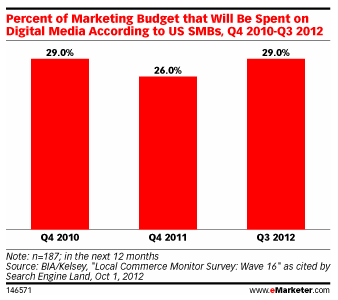Business owners understand they must transition a percentage of their marketing spend toward online channels. The majority of American companies engage in some type of internet marketing, and they excel in certain aspects. However, a recent eMarketer report, “Small Businesses as Tough B2B Customers: Shaky in Their Own Marketing, Critical of Marketing Aimed at Them,” reveals many small-to medium-sized business owners only have a modest level of marketing expertise, and they may make decisions based on feelings instead of figures.
In fact, eMarketer reported on data from Borrell Associates that noted SMBs plan to invest in Facebook marketing and run-of-site banner ads over every other online option in 2013. While these opportunities deliver results and maintain credibility, eMarketer writes that SBOs’ preferences may have more to do with personal comfort levels than accurate calculations of ROI.
The fact remains: Businesses will increasingly turn toward the web this year, with BIA/Kelsey noting that the average marketing department will devote approximately 29 percent of their budgets to digital media channels. There might be an urge to funnel the bulk of this resource into Facebook marketing campaigns, but businesses must develop a dynamic strategy that spreads media across the web in more than one way.
 A May 2012 survey by Constant Contact found that 76 percent of business owners can’t get to sleep at night because they’re concerned with how to attract new customers. To draw in new audiences, marketers must create online communities that offer engaging custom content to viewers, keeping sites fresh to compel prospects to come back again in the future. Content marketing fulfills this demand, with 91 percent of B2Bs and 86 percent of B2Cs already on board with the practice. These organizations have established corporate blogs, published white papers, developed infographic marketing strategies and reached out to new and existing customers through social media.
A May 2012 survey by Constant Contact found that 76 percent of business owners can’t get to sleep at night because they’re concerned with how to attract new customers. To draw in new audiences, marketers must create online communities that offer engaging custom content to viewers, keeping sites fresh to compel prospects to come back again in the future. Content marketing fulfills this demand, with 91 percent of B2Bs and 86 percent of B2Cs already on board with the practice. These organizations have established corporate blogs, published white papers, developed infographic marketing strategies and reached out to new and existing customers through social media.
Content marketing thrives as a successful lead generation practice because sustainable strategies empower brands to upload new media to their websites regularly. This keeps even the most distracted and fragmented audiences entertained and engaged, driving them to investigate companies and their products for longer periods of time. As more SMBs move a greater portion of their marketing spend toward online channels, content marketing will inevitably grab a greater piece of the pie, and prove it is, and always will be, important for brand lift and beyond.




